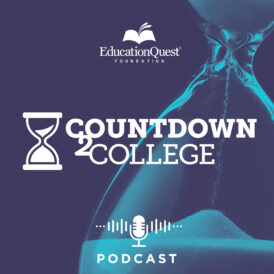We all have that one post, comment, or photo from years ago that makes us cringe a little. But when you’re gearing up for college, that “oops” moment could become more than just embarrassing; it might actually impact your future!
We sat down with Jason Combs, Director of Technology & Marketing at EducationQuest Foundation, to discuss what students should know about cleaning up their social media before applying to college, for scholarships, and for job opportunities.
Why is social media cleanup necessary before college?
Colleges aren’t just looking at your GPA and test scores anymore. Many schools have shifted to “holistic admissions,” which means they’re evaluating you as a whole person, including what they find online.
“They’ve got programs that will scrape social media platforms,” Jason explained. “They’re looking for a fuller picture of who you are, not just one moment or one mistake.”
It’s not just about admissions either. Scholarship committees, potential roommates, and even employers might scroll through your accounts to decide whether you’re the right fit.
What should students look for when cleaning their profiles?
Start with the obvious: illegal activity, offensive language, or anything that doesn’t reflect who you are today. But don’t stop there.
Jason also recommends considering things that might be totally legal but still problematic. For example, a post about using a product that’s legal in your state might not land well with a college in another state. Schools are looking at campus culture fit, too. Your content could influence how well they think you’d vibe with their environment.
If it doesn’t reflect who you are now or the student you want to be, consider taking it down.
What social media platforms do colleges check?
All of them. Seriously.
“Reddit, Discord, ghost accounts, sub-accounts, schools are getting smarter,” Jason said. And it’s not just school staff doing the snooping. Some colleges have students in tech or criminal justice programs who help conduct social media research.
Even private accounts aren’t always safe. Mutual friends, bots, and even paid services can sometimes access content you thought was locked down. “There are moles out there,” Jason warned. Don’t assume anything is invisible just because it’s private.
What does a “clean” social media profile look like?
Aim to look like a real person. Jason’s advice: “Be yourself — just in the best light possible.” Post what matters to you. If you’re passionate about music, art, or politics, let it show. Your social media should feel authentic, not artificial.
Surprisingly, being too clean can be a red flag. “Sterile profiles,” those with barely any posts or only perfectly curated content, can seem fake, bot-like, or like someone’s hiding something.
How can social media help you stand out (in a good way)?
When used well, your social profiles can show colleges exactly who you are. That’s called your personal brand, and no, you don’t have to be an influencer to have one.
“Social media is often the last place schools look, not the first,” Jason said. “But it’s what can tip the scale when two candidates are neck-and-neck.”
So use it to your advantage. Showcase your extracurriculars, part-time jobs, passions, and personality. EducationQuest even offers a free Activities Resume tool to help you keep track of what to highlight.
Is switching my account to private good enough?
Going private is a good start, but it’s not bulletproof. Some platforms only make new content private when you change your settings, leaving years of posts still publicly searchable.
Plus, your “private” circle may not be so private after all. Like we talked about earlier, fake accounts and bots often pose as friends to gain access. Even if you’ve gone private, do the cleanup just to be safe.
How often should students review their social media accounts?
Jason recommends checking in at least once a year, especially before your junior and senior years, when applications and scholarships become a priority. Summer is a great time to do it while things are quieter.
If cleaning up your accounts feels overwhelming, try doing it in chunks. Think of it like test prep. It’s easier to review a little at a time than cram everything the night before a deadline.
Are there any tools or shortcuts to help with cleanup?
AI could be your friend. Jason suggests using tools like Gemini or ChatGPT to run a quick self-audit.
Try this prompt:
“Act as a college admissions officer at [insert college]. Give five reasons why [insert your full name and city] might not be a good fit for your school.”
It’s a fast way to see what a stranger might notice and give you a heads-up on what to delete or rethink. There are also paid services to scrub your digital footprint, but most students can avoid those with a little effort.
What if someone else posts something about me?
You can’t control everything. But you can:
- Ask them to delete or untag you.
- Use the platform’s settings to remove your tag.
- Submit a takedown request if the content is damaging.
If a college or organization brings up a post or image you can’t get removed, be honest and prepared. “You just need to know what’s out there and have a response ready,” Jason said. “But don’t bring it up if they don’t.”
Jason’s final advice?
When in doubt, ask yourself: Would I post this on a billboard? If not, maybe skip it. Treat your social profile like a digital resume, thoughtful, intentional, and representative of your best self.
By Gage Boardman

June 24, 2025 · Season 1 · Episode 10
Social Media Cleanup for College
By Jason Combs
We all have that one post, comment, or photo from years ago that makes us cringe a little. But when you’re gearing up for college, that “oops” moment could become more than just embarrassing; it might actually impact your future!
